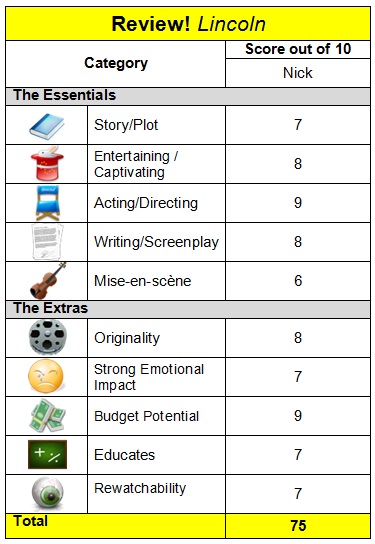 Lincoln (2012) Directed by Steven Spielberg. Starring: Daniel Day-Lewis, Sally Field, and Tommy Lee Jones. IMDB says: “As the Civil War continues to rage, America’s president struggles with continuing carnage on the battlefield and as he fights with many inside his own cabinet on the decision to emancipate the slaves.”
Lincoln (2012) Directed by Steven Spielberg. Starring: Daniel Day-Lewis, Sally Field, and Tommy Lee Jones. IMDB says: “As the Civil War continues to rage, America’s president struggles with continuing carnage on the battlefield and as he fights with many inside his own cabinet on the decision to emancipate the slaves.”

The second Daniel Day-Lewis steps onto the screen, he is no longer an actor; he is Abraham Lincoln. The way he moves, the way he talks, even the way he looks at people, is Abraham Lincoln. So much time and meticulous thought was put into his character alone, the rest of the film would really have to try hard to reach that level and it almost does. As much research and detail was put into the film, the story, to me, stalls out at something we already know.
The film looks at the last few months of Lincoln’s life as he tries to end the civil war and abolish slavery. Since we already know how that ends (Spoilers: South surrenders and slaves are freed) I thought the story would take a deeper look into his family life or his life growing up in Kentucky. I would have even enjoyed seeing how he came to Illinois and became a member of the House of Representatives and eventually go on to win the presidency. Instead, we see the same back and forth between him and Mary Todd (Sally Field) and after a while it just gets old. We get it: she was crazy, she over-reacted, and she was big on the guilt trips. Lincoln and his son Robert (a bland Joseph Gordon-Levitt) argue back and forth about Robert joining the military and it feels like an argument we’ve seen in any other film with this sub-plot in it.
And when Lincoln isn’t home, he’s continuing the fight to end the war and slavery. But he can’t do it alone he needs his cabinet. But when Lincoln interacts with any member of his cabinet or the House, unless a character comes out and says their name or job title, you have no idea who Lincoln is talking to or why. History buffs and Lincoln fans will know I’m sure, but the average filmgoer will be lost. And whenever Lincoln does speak, after a few sentences, he goes off into a monologue complete with emotionally driving score. Jess pointed this out to me as we left the theatre and the more I thought about it, the film, even though it does have a cohesive story and plot, at times could feel like a series of vignettes where everyone is down trodden and they don’t think they can do it but then here comes Lincoln with a story or joke followed by rousing words of “We Can Do It!” Obviously he says more than that, but it’s those moments when he speaks, that you can feel how silent the theatre is as they hang over every word. There were times when I was so entranced by Lincoln and his words, I was ready to jump from my seat and shout, “He’s right! We are all created equal! Let’s put a stop to slavery!” But then I realized where I was and squashed the thought.
Aside from Lincoln’s performance, which is hard to match, the biggest surprise came from Tommy Lee Jones. I know he can act and I enjoy his films, but his role as a Pennsylvania Representative caught me off guard and became the perfect balance to Lincoln as the two pushed to end slavery using their own methods; Lincoln used words to bring people together whereas Jones’ character belittled people. It brought humor at just the right times to a drama that tends to drag when Lincoln isn’t on the screen. The only culprit I can find is the script and the story in general. Again, if we looked at other aspects of his life than the things we knew about, I’m sure I’d be singing another tune. But the film told us the story of something we already knew, and it’s hard to keep one’s interest when they know the ending.
That being said, it’s still a solid film with great acting and a look and feel that really captures the moment. The score, feels recycled, but it still adds to the moments when Lincoln speaks or those tense moments of piecing the votes together. At over two hours, Lincoln is a film many will enjoy and few will consider a masterpiece.
Lincoln hits theaters nationwide November 16th.



